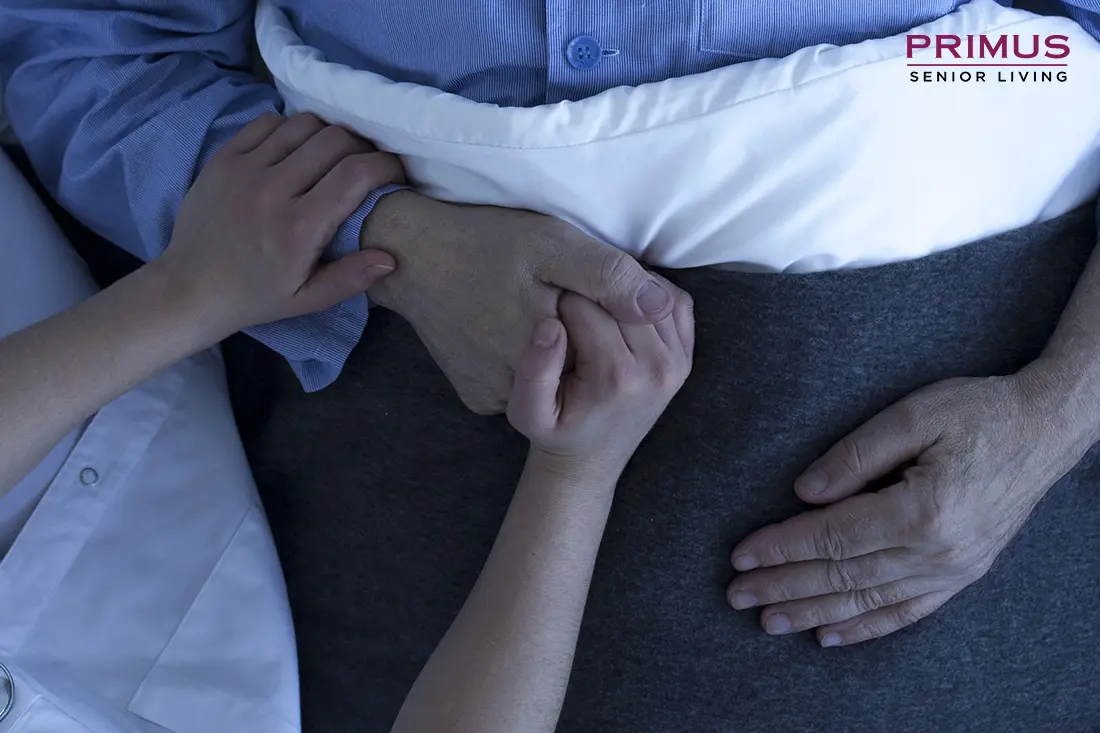When dealing with the challenges of illness, our immediate attention tends to focus on helping our loved ones recover physically. However, in this effort to address the body's health, we often unintentionally overlook the equally important aspects of mental well-being and overall care. While young people may bounce back more quickly, the elderly face more challenges that emphasise the need for a broader and more holistic perspective. The path to recovery requires a thoughtful and comprehensive approach involving time, effort, and deep care.
In recognition of this need, assisted living centres have evolved to incorporate palliative care as a cornerstone of their services, prioritising pain relief and a comprehensive overall strategy that addresses the multifaceted dimensions of well-being.
Primus Senior Homes bring some light into compassionate care in this blog, emphasising the profound impact of a holistic approach in palliative support for our elderly population.
What is Palliative Care:
Palliative care is about improving the quality of life for people with serious illnesses. It's not just about easing pain; it's about looking at the whole picture. This includes addressing physical, emotional, and social challenges. For seniors, it's important to tailor this care to their specific needs, taking a comprehensive, personalised & holistic approach to support them in the best way possible.
What Are The Factors That Come Under Holistic Palliative Care?
Physical Well-Being:
For any disease, one of the most critical factors for improvement is the timely administration of medication. However, what is often overlooked is that physical well-being involves more than just taking medicine. Physical activities play a crucial role in the healing process. Alongside timely medication, physiotherapy or exercises should be incorporated to manage symptoms and improve overall health.
Emotional Support:
Being in a long-term or serious illness can significantly impact a person's mental health. It's crucial to acknowledge the profound impact of illness. While families and friends may extend support to keep the individual active and happy, seeking professional help for mental well-being is often essential. Emotional support through counselling, therapy, and compassionate care can substantially impact the individual's well-being.
Social Connection:
Different types of diseases fall under palliative care, and depending on the seriousness of each illness, there might be instances of social isolation. This can be due to the risk of infections or the patient restricting interaction with others. This isolation is a significant contributor to loneliness among the elderly, leading to additional problems. It's vital to recognise potential isolation caused by health issues in advance and actively promote social interactions with like-minded individuals to maintain a sense of community.
Spiritual Care:
Everyone has their own religious or spiritual beliefs, and these beliefs may face challenges during difficult times. Therefore, it's important to respect the spiritual beliefs of individuals and offer support and guidance as part of the holistic care approach. This gives individuals hope and motivation to persevere through challenging times and strive towards recovery.
Why Choose Assisted Living for Holistic Palliative Care?
Individual Preference:
When residing in an assisted living centre, one key advantage is the absence of distractions for patients. Here, dedicated care is provided regardless of the time, ensuring that individuals receive the attention they need around the clock.
Comprehensive Care Facilities:
Assisted living centres have infrastructure and professional staff that cater to comprehensive care, addressing physical needs and emotional and spiritual aspects. Sometimes, the facilities required for optimal care might be challenging to provide at home, making senior assisted living centres a practical choice for meeting diverse needs.
Trained Caregivers:
The personnel at senior assisted living facilities undergo specialised training to handle the unique needs of the elderly population adeptly. As individuals, we may not possess an in-depth understanding of every nuance of our loved one's disease. In assisted living centres, trained caregivers, including nurses, doctors, and palliative care specialists, work collectively to provide holistic care, ensuring every aspect of an individual's well-being is attended to with expertise and compassion.
Community and Social Engagement:
Assisted living centres like Primus Senior Homes foster a community-oriented environment that actively encourages social interactions and engagement—a vital component for the overall well-being of elderly individuals. Living amidst like-minded peers who remain active, even while dealing with health challenges, is a powerful motivator. Furthermore, these centres often organise various activities, creating a vibrant social calendar that ensures the elderly remain socially engaged and active.
Choosing assisted living for holistic palliative care isn't just a practical move; it's a new beginning. It means giving our elders a haven where their needs are met with respect and understanding. It's not just about dealing with symptoms; it's about creating an environment where joy and companionship thrive. In this blog, we have covered how assisted living centres bring a new level of care to our elderly loved ones. It's not about medicine and treatments; it's about understanding that our seniors need more than that. Assisted living centres get it right by creating a space where time slows down, distractions fade away, and care is available around the clock.
So, opting for assisted living isn't merely a choice; it's a commitment to providing care beyond the basics. It's about giving our elders a place where every moment is valued, and every need is met with kindness and consideration.
You may also like

5 Questions Adult Children Ask About Senior Living!
When it comes to our parents, we want nothing but the best for them. As much as one would want to spend time with their parents and be around them all the time, it's not feasible. That's what Senior Living homes are for. Senior living homes offer your parents the freedom to live their life without the burden of having to depend on anyone under a secure environment. It is only fair that you'd want your parents to be at the best senior living institution.
READ MORE
Retirement Planning: What’s Next In Senior Living
Retirement planning has entered a new era. Senior living is no longer a dull, separate place where seniors feel away from their friends and family. Nowadays, it is various categories of housing, built with amenities and health care, supported by soulful communities of people in their golden years.
READ MORE

Leave a Comment